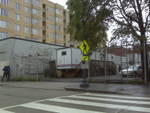LISTEN TO BRIAN ANDERS HERE
Audio clip: Adobe Flash Player (version 9 or above) is required to play this audio clip. Download the latest version here. You also need to have JavaScript enabled in your browser.
The run-down trailers at 1436 Girard St, NW, which make up the La Casa shelter, go unnoticed by most passersby. Located in Columbia Heights, a gentrifying – largely gentrified – neighborhood, the trailers seem out of place. Overshadowing them, literally, are luxury apartments owned by Donatelli and Klein, the new owners of the land upon which the La Casa shelter sits.
In order to clear the way for yet another high-end development, the men who stay at La Casa will be housed elsewhere by October 15th, according to District officials.
La Casa’s closure comes two years after the closure of Franklin Shelter, also located in northwest D.C. Very few shelters remain in or near the downtown area, where access to food, services and job opportunities are most readily available.
Brian Anders, a long-time homeless advocate and member of Empower DC, said, “They’re just pushing people further and further away from the business corridor. In my head the rationale is ‘out of sight and out of mind.’ If you don’t see poor people, you don’t know poor people exist. If you don’t see homeless people in your community, you assume that they don’t exist. You assume that people are being taken care of because the Post reports that all of these people are getting apartments.”
Anders questions how much benefit gentrification has brought to long-time residents of Columbia Heights. He said, “Now you go around in this neighborhood and you see people with these ornate fountains in their yards, big statues. You see that the neighborhood is changing, but it’s not changing for the people that live here. It’s changing to invite new folks to come into the District. People with higher incomes, supposedly better educated. In a way it’s kind of saying to the people who have been born in this neighborhood, ‘You don’t belong here any more. There’s no place for you here.’ “


